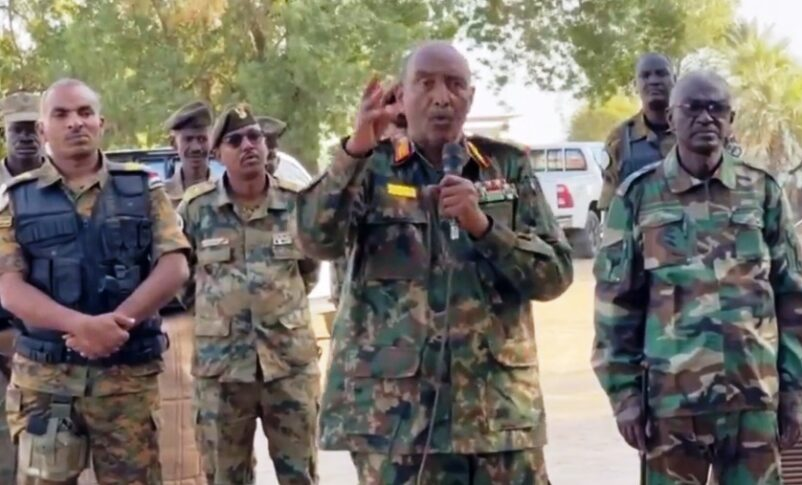In a significant shift in strategy, Sudanese Army Commander-in-Chief Abdel Fattah Al-Burhan has directed the army and allied armed movements to launch a full-scale offensive against the Rapid Support Forces (RSF), aiming to expel them from all areas under their control.
Al-Burhan’s announcement, made during a visit to Kassala State, came amidst a comprehensive mobilization of Sudanese army forces and armed movements from Darfur, who are receiving extensive military training and support from civilian volunteers.
Addressing troops from the 11th Infantry Division in Khashm Al-Girba, Al-Burhan declared, “We will no longer be on the defensive. We will advance and attack with the forces of the movements from all directions, from Darfur and the eastern states, the central states, and the northern states, relying on the will and determination of the Sudanese people who stand united with their armed forces against these rebels.”
Upon the outbreak of the armed conflict with the Rapid Support Forces, Al-Burhan instructed his troops to prioritize defensive manoeuvres and abstain from offensive actions. Simultaneously, he initiated training programmes to prepare the army for guerrilla warfare and acquired weaponry and vehicles specifically tailored for this type of combat.
This announcement marks the official transition from a defensive posture to an offensive strategy against the RSF, almost nine months after the conflict began.
Victory through negotiations
Burhan has positioned himself as a proponent of negotiations for resolving the ongoing conflict, but has also maintained a firm stance against external interference and warned against the potential for Hemetti’s treachery.
Sudanese Army Commander has expressed his willingness to engage in negotiations with the Rapid Support Forces, but only under certain conditions. He has emphasized that the Rapid Support Forces must vacate civilian areas and return looted goods to both citizens and the state.
While Burhan acknowledged that negotiation can sometimes lead to victory, he also stressed that the army will not hesitate to resort to force if necessary to reclaim what was taken by force.
He reiterated that Sudan will not accept solutions imposed by external parties, including the Intergovernmental Authority on Development (IGAD). He dismissed IGAD’s involvement, stating that the organization should not meddle in Sudanese affairs.
Instead, Burhan urged politicians to seek solutions within Sudan and engage in dialogue with all segments of society to reach mutually agreeable outcomes. He specifically addressed Abdallah Hamdok, former Prime Minister the head of the Coordination of Civil Democratic Forces (Tagadam), and reiterated that any negotiations must take place within Sudan’s borders.
Warning political forces of the dangers posed by RSF Commander Mohamed Hamdan Daglo “Hemetti”, Burhan branded him as “a treacherous man without a covenant.” He cited Hemetti’s past betrayals of the army and intelligence officials, along with numerous assassinations against his own comrades.
Instigator of sedition
Al-Burhan further highlighted the severe atrocities perpetrated by the RFS against civilians and their attacks on infrastructure.
He characterized the RSF leader as “the instigator of sedition and the ringleader of criminals.” He accused Hemetti of spreading misinformation by claiming that civilians were approaching RSF sites, stating that paramilitary forces were the aggressors, attacking innocent and defenceless citizens.
“We will pursue the leader of the rebellion, hold him accountable, and make him responsible for the actions of his militia, including theft, looting, murder, and rape.” He added, “The Sudanese people will never forget the heinous crimes of the Rapid Support Militia, as these acts of immorality are not in line with the values of the Sudanese people.”
He affirmed that the armed forces will remain steadfast in their positions, will not yield, and will not pardon those who have desecrated the dignity of the Sudanese people, stolen their possessions, and shattered the security and stability of citizens.

